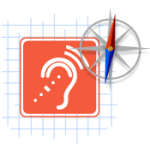Audio Visual Components
Find out in advance if your facility has any assistive listening systems or devices available, how the meeting room is wired and equipped for sound amplification, and if there are additional costs for accessibility equipment and associated services. Ask if the facility has experience offering Communication Access Realtime Translation (CART) services, or if they have a local contact who can provide this service if needed.
Many individuals who attend your event will neither disclose their need for accommodation nor offer any visible clues to their needs. This is often the case with individuals who are experiencing gradual loss of hearing or vision due to age. For this reason, keep universal access in mind when planning the AV components of your meeting.
Managing Question and Answer / Audience Participation
There are a variety of strategies and tools, from low-tech to high-tech, for managing audience participation in a large gathering:
-
When wireless microphones and staff are available:
-
Ensure at least two to three staff with wireless microphones are circulating in the crowd during question and answer periods.
-
Instruct speaker and panelists not to answer questions from individuals who are not using a microphone.
-
Be aware that attendees with electrical sensitivities may not tolerate wireless microphones. In this case, ask an event staff member to convey the question via microphone for the attendee.
-
-
When microphones are not available:
-
Place blank cards and pens on each table and tell attendees in advance to use these to write down their questions. Cards can then be collected and speakers can read them into the microphone before answering. Plan for staff to assist participants who are not able to write on cards.
-
Less optimal: have questions called out to speakers, who then repeat the questions into the microphone before answering.
-
-
Presentation Materials / Slides and Video
Provide guidance for presenters well in advance of your event (also see the section entitled Tips for Presenters).
Slides: These guidelines for PowerPoint or other projected presentation materials are from the Training and Advocacy Support Center (TASC)(link is external), a division of the National Disability Rights Network:
-
Use a sans serif font (e.g., Arial)
-
Use a large font size -- at least 22 point
-
Use a dark text font and a light-colored background
-
Text on a slide should have nothing behind it (no watermarks or images)
-
Provide “alternative text” descriptions for all images, pictures, graphics, tables, etc.
Videos: Videos should be captioned.
YouTube: YouTube Help provides a list of professional captioning vendors, as well as instructions to add subtitles and closed captions to your own video, either manually or automatically. Be sure to review and edit automatically generated captions. A number of common issues, such as poor sound quality, can cause inaccurate captions.
If there is no way to have a video captioned, it is best not to use it. If a video without captions must be used, a sign language interpreter or speech-to-text service provider may be able to convey the audible content. In such cases, give the service provider ample time to watch the video prior to the meeting.
Handouts and printed materials: Printed materials may need to be converted to accessible formats for people who are blind or have low vision. Since it can take up to 30 days to create these accessible formats, make sure you require presenters to send you their materials far enough in advance to make this possible.


User Comments/Questions
Add Comment/Question